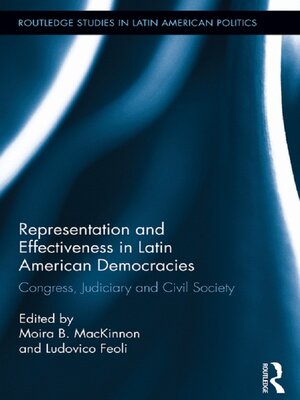Representation and Effectiveness in Latin American Democracies
ebook ∣ Congress, Judiciary and Civil Society · Routledge Studies in Latin American Politics
By Moira B. MacKinnon

Sign up to save your library
With an OverDrive account, you can save your favorite libraries for at-a-glance information about availability. Find out more about OverDrive accounts.
Find this title in Libby, the library reading app by OverDrive.



Search for a digital library with this title
Title found at these libraries:
| Library Name | Distance |
|---|---|
| Loading... |
Legislatures, the judiciary and civil society are important actors in representative democracies. In what ways and how well do they represent? And how effectively do they carry out their institutional and social roles? Both questions refer to the key dimensions of democracy analyzed in this book: representativeness and effectiveness, respectively. While they have been developed separately in scholarly work on institutions and regimes, there is little work considering them simultaneously, and on their interaction. Using quantitative and/or qualitative methods, contributions from top scholars in the field of legislatures, the judiciary and civil society examine these two concepts and their relationships in four Latin American countries: Argentina, Brazil, Chile, and Mexico.
Designed to guide the reader through the complexities of this debate, each expert engages in a larger set of theoretical debates about different approaches to representation in each sphere. In doing so, they debate how effectively these spheres carry out their roles in each country: whether a congress is institutionalized, its accountability, and its performance as a lawmaker; whether a judicial system is independent, carries out oversight, and protects citizen rights; and the role of civil society in a representative democracy.
Representation and Effectiveness in Latin American Democracies is a timely and welcomed contribution to the to the growing debate about the quality of democracy in Latin America, and the developing world more generally.







